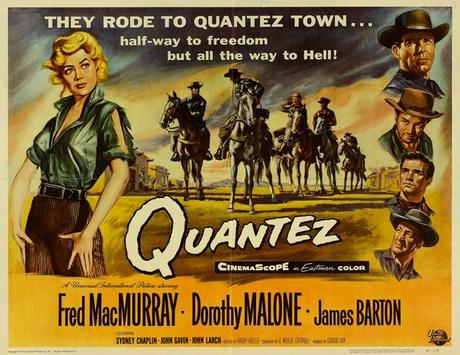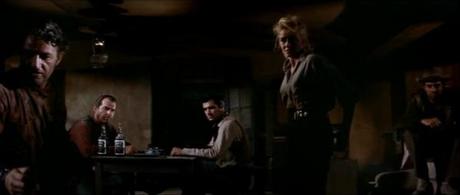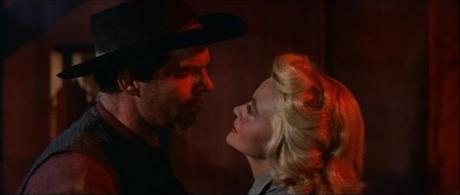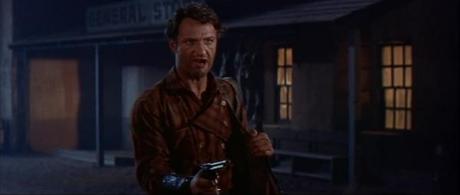
Men ride longer over blood than money.
The western as a chamber piece almost seems like a contradiction in terms, doesn't it? The entire genre is built around the concept of the frontier, of space and expansion, of looking out rather than looking in. In purely physical terms, the western is at heart an outdoor creature. For all that, it's not so difficult to find examples of the genre retreating indoors, tales withdrawing into a confined space to better facilitate their telling. Off the top of my head, , , The Secret of Convict Lake and The Outcasts of Poker Flat are just a handful of titles adopting this approach that I've featured on this site. Quantez (1957) slots comfortably into this category and offers an object lesson in how to maximize the potential of a superficially narrow setup.
Quantez is a movie full of contrast and even the shape of the narrative is a reflection of this, alternating between urgency and torpor, light and dark, a flight from fear and a race towards renewal. The opening is all pace, urgency and desperation, figures in the primal landscape of the west running for their lives. That they are outlaws is soon apparent and those in pursuit are seeking justice for robbery and murder. Heller (John Larch) is the leader, a bully and sadist who is keen to build his notoriety, yet he still defers to some extent to the terse and enigmatic Gentry (Fred MacMurray), sensing perhaps that he's in the presence of someone who can be neither bested nor intimidated. The remainder of the party is made up of Chaney (Dorothy Malone), who has the dubious honor of being Heller's woman, a brooding young man by the name of Teach (John Gavin), and a bitterly resentful half-Apache called Gato (Sydney Chaplin). These five are making for the town of Quantez in the hope of evading the posse on their heels. However, their arrival reveals the town as an abandoned shell of a settlement, a place whose residents have hastily vacated and which is being observed by a threatening Apache band. So, amid the dust and debris, the five fugitives in search of salvation have landed in what is in effect an anteroom, the last stop before redemption or retribution. Which is it to be? An evening of enforced confinement will eventually lead to a decisive confrontation, and for one of them at least, a form of spiritual rapprochement.

Quantez is very much the chamber piece I spoke of at the top of this piece and acts as a useful illustration of how this form can be applied successfully to a western setting. It's the juxtaposition of perspectives which works to its overall advantage. The classic western protagonist is one who is forever in pursuit of freedom, sometimes from the constraints of the old world, and sometimes from the encroachment of civilization and its deceptive allure in the new. Who better to demonstrate this than fugitives from the law? Essentially damned by their previous actions, they are forced by circumstances into confinement, where the physical restrictions imposed give rise to heightened emotional pressure. The effects of this pressure and the increasingly powerful draw of those open vistas that are left behind, but remain tantalizingly near in the future, have the potential to produce a purer distillation of drama.
Director Harry Keller did a lot of TV work as well a string of B westerns, none of which I can claim to be familiar with. He also had a run of interesting looking features in the mid to late 1950 and only a few of those are readily available. I have seen and enjoyed Six Black Horses but is even stronger. Of course it has to be acknowledged that a good deal of what makes this movie so attractive is the visuals, and cinematographer Carl E Guthrie worked some genuine magic with his lighting and his shooting of the interiors.

I know there are those who feel sees Fred MacMurray at his best in a western role, and it is unquestionably a fine movie with a strong central performance from the lead. Nevertheless, I'm of the opinion that Quantez tops it, and I'm especially fond of the shading MacMurray brings to his characterization of Gentry, the ultimate fugitive on the run from the law, the past and the whispers of his own conscience. He brings confidence to his movements, conveying the experience and assuredness of the character perfectly. His delivery of the dialogue is spot on too, that clipped abruptness making it seem as though the words were rushing to catch up with their meaning.
Dorothy Malone could do little wrong around this time. She had just come off an Oscar winning role for Douglas Sirk in Written on the Wind and would go on to do equally good work for the same director in The Tarnished Angels. The part of Chaney gave her an opportunity to portray a woman who has almost given up on self-respect, but not entirely - there's still a fragile thread to cling on to. In some ways I was reminded of Claire Trevor's fading moll in , not least when she was enduring humiliation for her singing at the hands of John Larch. The latter manages to nail the brutal worthlessness of his character, a man who has yet to meet a moral he hasn't spat on. While John Gavin and Sydney Chaplin essay varying degrees of good and bad with moderate success they end up somewhat overshadowed by those around them. On the other hand, James Barton is excellent as the nameless minstrel, a figure who drifts in as though from some classical tragedy and whose song and art serve to dispel some of the shadows of the past and also inspire a rebirth of sorts.

Quantez is quite widely available on DVD and there has also been a satisfactory Blu-ray release in Germany from Koch Media. That said, it's worth pointing out that there is a US Blu-ray in the pipeline which will feature a commentary track recorded by Toby Roan. This is a little gem of a western which remains criminally underrated. I've been a fan of it for ages now and I'd urge anyone who hasn't seen it to check it out.
